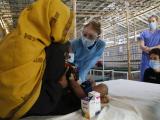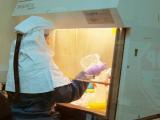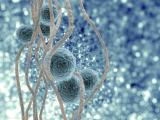Dec 8, 2004 (CIDRAP News) Human testing of an experimental vaccine against the deadly toxin ricin will begin early next year at the University of Texas Southwestern Medical Center in Dallas.
The Food and Drug Administration and the university's institutional review board have approved the phase 1 trial involving the Category B biological agent. The toxin is processed from castor beans. Exposure can result from breathing ricin, eating or drinking it, or being injected with it.
The university is already posting notices for human volunteers, said John Schindler, PhD, an assistant professor at the Cancer Immunobiology Center and director of the clinical trial. Fifteen volunteers will be split into three dosage groups and receive one injection a month for 3 months.
Volunteers' immune responses to the vaccine will be tested, and serum from the human volunteers will be injected into mice, Schindler said in an interview today. Then the mice will be exposed to high levels of ricin to test whether the human serum contains protective antibodies.
"As far as we can tell, the vaccine is completely safe and has no side effects," said Dr. Ellen Vitetta, director of the Cancer Immunobiology Center, in a news release issued by the university.
An approved vaccine would be at least 4 years away, Schindler said.
This round of testing is intended to confirm the vaccine's safety at doses that elicit effective antibody levels in healthy people, according to the news release. Funding for basic work, such as setting up the ricin aerosol and oral challenges, comes from the National Institutes of Health (NIH), Vitetta noted in an e-mail. However, the trial is being funded by the Cancer Immunobiology Center.
DOR BioPharma, Inc., has an exclusive license for the vaccine, the news release said. The company is planning to produce a stockpile for more advanced clinical trials, product licensing, and potential purchases by the US government and others.
"Is the common man on the street going to need a vaccine to protect against ricin? I sort of doubt it," Schindler said. But the military has an interest in defenses against the potential bioweapon, and high-ranking public officials may as well, he added.
Ricin has been used as a weapon. Bulgarian writer Georgi Markov was killed in London in 1978 when an attacker used the point of an umbrella to inject a ricin pellet under his skin. Ricin powder was found Feb 2, 2004, in the office of Senate Majority Leader Bill Frist, R-Tenn., prompting the temporary closure of several Senate office buildings.
The vaccine is the result of coincidental timing, said Schindler. Vitetta's group has noted that a genetically modified form of ricin used as an immunotoxin to kill cancer cells produced an antibody response in cancer patients during experimental therapy.
"Even in cancer patients whose immune systems are suppressed, we have an antibody response," Schindler said. From there, it was a relatively short step to creating a recombinant vaccine.
At the same time, public concern about the potential for bioterrorism was heightened, providing enough interest to make creating the vaccine worthwhile, he said.
See also:




















